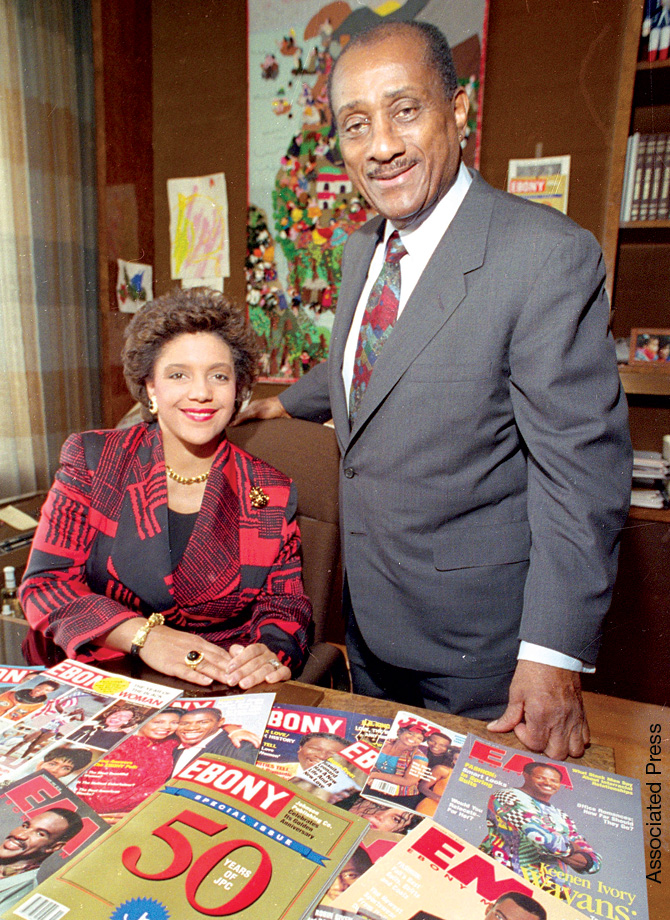Matriarch ascendancy

Dominique Hériard Dubreuil didn’t plan on joining the family business. As a drinks company, Rémy Cointreau operated in a male-dominated industry and she had three brothers – who seemed like natural successors in 1960s and 1970s France.
Instead, she wanted to carve out her own path, which she did working in marketing and communications, until one day, aged 42, she got a phone call from her father and brothers. They wanted her back. The grand dame of Cognac now heads up the Paris-based company and regularly features on lists of the world’s most powerful women. Yet she wasn’t the planned successor – for a long time, few daughters were.
One of the main reasons for this is that women have traditionally been viewed as temporary employees, available to work until they married, says Colette Dumas, from US-based Suffolk University, in the book Father-Daughter Succession in a Family Business. Their place was in the home, it was generally believed, meaning women were not given the same developmental opportunities as their brothers, she says. In some cases, women did lead family businesses, but usually only because of difficult circumstances, such as the unexpected death of a husband, says Dr Christina Erdmann from Germany’s Witten Institute for Family Business, who heads the institute’s Women in Family Businesses – Daughters in Succession research programme. “The woman ran the business for five to 10 years, until the sons grew up and then the woman stepped back.”
For example, in 18th century France, Wendel family descendent Marguerite d’Hausen (pictured above) ran the family’s iron forges, along with her sons-in-law, after the death of her husband, Charles de Wendel. Later, her grandson François de Wendel left his wife Joséphine de Fischer de Dicourt the business and she managed it with her son and son-in-law. Following her children’s death, she created a partnership company – the forerunner to investment business Wendel, which had net sales of almost €5.5 billion in 2010.
Although the wives and daughters of business leaders didn’t traditionally work directly in the company, they were often involved behind the scenes, entertaining clients or keeping the books. “The matriarch of the family could be considered the chief emotional officer of the family, nurturing and supporting family members involved in the business and mediating when necessary,” says Alexandra Sharpe from London-based consultancy Peter Leach.
Many women still fulfil this role – the Witten Institute is currently carrying out research on the role of wives in family businesses, looking at how they help husbands and the next generation while carving out their own lives. Kate Murphy, head of UK family business at JP Morgan Private Bank, reckons female relatives of family business patriarchs play an even more important role than the wives of chief executives in non-family firms.
“Within family businesses, because you are working so closely with relatives, there can be issues,” she says. “The women of the family are often brilliant at sorting out those issues ... the fact that they are working behind the scenes makes it much easier for them to come in and help resolve issues.”
But wives aren’t just playing peacemaker any longer – some, such as Mindy Rich, vice-president of Rich Products and wife of the founder’s son Bob Rich, are working directly in the companies. In fact, over the last few decades, female family members – wives, daughters and sisters – have increasingly taken on roles that would have traditionally gone to their brothers, uncles or male cousins, reckons Sharpe. Families are “recognising that the best way to keep the family firm in the family is to make sure that as many family members as possible – including women – understand the family business and appreciate what the firm can offer them as a career”, says Mary Barrett, professor of management at Australia’s University of Wollongong and co-author of the book Women in Family Business Leadership Roles: Daughters on the Stage.
 This was the case for Ofra Strauss (pictured right), chairwoman of the Strauss Group, an Israeli food and beverage company. The 51-year-old says she was encouraged to join both the business world and her family firm, and started working at Strauss 20 years ago following a stint at Estée Lauder. The big advantage of family businesses is that they can “really plan ahead and look at how [the next-gen] would join the business and where”, she adds.
This was the case for Ofra Strauss (pictured right), chairwoman of the Strauss Group, an Israeli food and beverage company. The 51-year-old says she was encouraged to join both the business world and her family firm, and started working at Strauss 20 years ago following a stint at Estée Lauder. The big advantage of family businesses is that they can “really plan ahead and look at how [the next-gen] would join the business and where”, she adds.
For others, like Linda Johnson Rice, the route to the family business wasn’t as formally planned. The 53-year-old, who heads up US-based Johnson Publishing, responsible for magazines such as Ebony, says she was never officially asked to join. Instead, she “grew up” in the business – spending every afternoon after school at its head office, going to the editors’ offices and the art department, as well as accompanying her mother, fashion director Eunice Walker Johnson, on fashion trips to Europe. However, publishing wasn’t Johnson Rice’s only passion – she studied opera and voice for six years and thought about having that as a career. “But then I keep going to the office – and you meet such interesting and fascinating people – and I thought this is going to be a lot more fun,” she says.
The World Bank estimates that women now own or operate 25% to 33% of all private businesses worldwide. Many of those will be small, one-person outfits, but an increasing number of women, such as Henkel’s Simone Bagel-Trah, Sonepar’s Marie-Christine Coisne-Roquette, Hyundai’s Hyun Jeong-eun and Carlson Companies’ Marilyn Carlson Nelson, as well as Strauss, are running multi-billion-dollar, family- controlled businesses.
“There seems to be a greater emphasis on getting women into senior positions within companies and family businesses are probably trying harder than most,” says Murphy. In fact, a recent study by UK-based private bank Coutts found that 52.44% of people believe there are more opportunities for women at family businesses than in the private sector in general. The five-yearly American Family Business Survey, last carried out in 2007, found that there has been an almost five-fold increase in the number of female leaders in family businesses since 1997. It should increase even further – almost a third of firms indicated they could have a female successor in the future.
Getting more women involved makes sense, says Strauss. The old tradition of excluding 50% of possible successors, just because of their gender, restricted businesses, she reckons. “If they are talented, it’s good for business,” she adds. “Women are just as good as men, so why not use this resource?”
Female employees are linked to stronger business performance, leading to questions “about the need to have more women, not just for diversity but because this impacts the bottom line”, says Barbara-Ann King, head of the female client group at Barclays Wealth. A study by Nick Wilson of UK-based Leeds University Business School found that having a woman on the board could reduce a company’s risk of bankruptcy by 20%. In companies where women make up 30% of the board or senior management, the business was more likely to outperform its peers, research by McKinsey found. Another study, presented at the British Psychological Society’s annual occupational psychology conference in January, found that women make better leaders during recession.
This is because there are differences in the way men and women work, says King. “There has been a focus on seeing men and women as the same, but if we all take a step back and think about it, women and men are not the same. Biologically, our brains work differently,” she says.
“Female skills are not better or worse – they are just different. It’s important to have a balance in companies,” adds King. Women are  frequently linked with multitasking and that is exactly what they do, says Johnson Rice (pictured left). “Men tend to be a little more linear and really focus on one thing and attack that. But I think women can focus on several things and attack them all,” she reckons. They’re also better at seeing the big picture, she says, and “pulling all those pieces together”, while men are more likely to compartmentalise. Traits like empathy, creativity and strong emotional awareness are also typical of women, says King. Hériard Dubreuil adds: “Women in business usually are very devoted, they take it to their heart and when it’s a family business, it’s even more motivating.”
frequently linked with multitasking and that is exactly what they do, says Johnson Rice (pictured left). “Men tend to be a little more linear and really focus on one thing and attack that. But I think women can focus on several things and attack them all,” she reckons. They’re also better at seeing the big picture, she says, and “pulling all those pieces together”, while men are more likely to compartmentalise. Traits like empathy, creativity and strong emotional awareness are also typical of women, says King. Hériard Dubreuil adds: “Women in business usually are very devoted, they take it to their heart and when it’s a family business, it’s even more motivating.”
But despite women’s growing presence and an increased appreciation of their talents, there is still a lot to do. A 2010 study, carried out by RMIT University in Melbourne and accounting firm MGI, found that only 7% of Australian business owners involve their daughters in operations. “There aren’t enough daughters taking control, whether this is because they are not encouraged or because they don’t want to,” says King. In some countries, this is often down to cultural reasons. “In India, the prevailing culture is for businesses to pass down the male bloodline,” says Sharpe. Consequently, few women run big family businesses in India.
In other cases, leaders are wary of involving female family members because of financial issues. “Sons traditionally have been more likely than women to be chosen for top roles, because a woman who has control of the family firm’s assets may tend to divert these assets from the family if she marries,” says Barrett. She and Ken Moores, professor in family business management and director of the Australian Centre for Family Business, found that this view is still commonly held today, despite the feminist movement and government legislation relating to boards and female equality.
“Plenty of male chief executives [in western businesses] were still vaguely worried that a daughter’s marriage – or divorce – could lead to family assets being diverted away from the original family,” says Barrett. And in some cases, it’s not just a matter of the father’s decision – inheritance laws in certain regions, such as the Middle East, still tend to favour men, says Sharpe.
Even if they are given the chance to lead a company, balancing a personal life with running the business can be challenging. As part of their research into women in family businesses, Erdmann and Dominique Otten, a research assistant at Witten, spoke to many women who said they have struggled to find a “partner who is willing to take on the role of ‘husband of’”, says Otten. This is particularly the case in well-known companies or where the business plays an important role in the region.
 Being a mother and a successor can also be difficult. While those in non-family companies may be better placed to take advantage of maternity leave, the close link between the business and the family means many female successors struggle to separate the two. “I was working at home when I was on maternity leave,” says Jacqueline Gold (pictured middle), chief executive of UK-based lingerie retailer Ann Summers.
Being a mother and a successor can also be difficult. While those in non-family companies may be better placed to take advantage of maternity leave, the close link between the business and the family means many female successors struggle to separate the two. “I was working at home when I was on maternity leave,” says Jacqueline Gold (pictured middle), chief executive of UK-based lingerie retailer Ann Summers.
The 51-year-old, credited with growing the business’s sales from £83,000 (€100,000) in the 1980s to £150 million today, has a daughter, Scarlett, and says balancing being a mother and a businesswoman is “very challenging”. But giving up work wasn’t an option for her. “Working and doing what I do is part of my identity,” she says. Johnson Rice also admits it’s not easy juggling two full-time positions. Although she tried to take extra time off during the first year after her daughter Alexa was born, she says she was “constantly working” at the same time.
But for some, returning to the family business enabled them to have the family they wanted – many women, interviewed for academic research by Otten and her colleagues, said they felt they wouldn’t have to choose whether to further their career or have children if they joined the family company. “Women can come and go more readily from the family firm than from non-family firms,” reckons Barrett.
Even so, both Johnson Rice and Gold believe having good support remains vital. “There is no denying you have to have lots of support around you, whether it be your family or other help,” says Gold. But the most important thing is being organised, they say. “I absolutely adore spending time with my daughter, but I just make sure the time we have together is good quality time,” says Gold.
It’s also important to prioritise other family relationships, reckons Mark Evans, head of Coutts Institute. “One of the key issues is making sure that the home does not become an extension of the office and that time is put aside to maintain family relationships and not let the business have an impact throughout everything the family does,” he adds.
Although neither initially planned on joining their family businesses, Johnson Rice and Gold would “love” if their daughters one day took over, but there won’t be any pressure. “At the end of the day I want her to be happy, whatever she does,” says Gold. Johnson Rice has a similar view: “If she should decide to come into the family business, it would be wonderful, but I will not pressure her to do that.”
So what should next-gens, like Tanya Godrej, Delphine Arnault Gancia, Holly Branson and Adriana Cisneros de Griffin, do to prove  they are worthy of leading the family business? “They need to learn from everyone around them,” says Strauss. But the most important thing, she says, is “saying very loudly that this is what you want and then walk the talk”.“They have to be willing to work as hard as they would outside to prove themselves. Women always have to prove themselves,” adds Hériard Dubreuil (pictured left). Johnson Rice reckons the key is “making yourself as indispensible as possible, which means you are there earlier, you stay later, you become a team member and … you don’t act like you are the chosen one”.
they are worthy of leading the family business? “They need to learn from everyone around them,” says Strauss. But the most important thing, she says, is “saying very loudly that this is what you want and then walk the talk”.“They have to be willing to work as hard as they would outside to prove themselves. Women always have to prove themselves,” adds Hériard Dubreuil (pictured left). Johnson Rice reckons the key is “making yourself as indispensible as possible, which means you are there earlier, you stay later, you become a team member and … you don’t act like you are the chosen one”.
Hériard Dubreuil also recommends taking advantage of chances to gain more experience. “I have been offered different positions [at organisations and on boards] because I was a woman and I took advantage,” she says. That helped her gain experience and cement her reputation. But Hériard Dubreuil says next-gen females shouldn’t automatically rule out working outside the business either. “The opportunity to have a good career is the one to take, whether it’s in a family business or another.”






